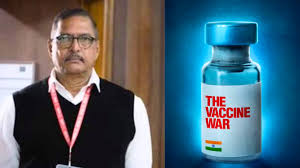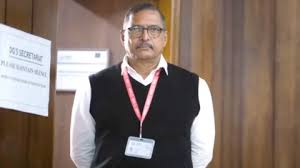|
|
||
|
Pro Tools
FILMFESTIVALS | 24/7 world wide coverageWelcome ! Enjoy the best of both worlds: Film & Festival News, exploring the best of the film festivals community. Launched in 1995, relentlessly connecting films to festivals, documenting and promoting festivals worldwide. Working on an upgrade soon. For collaboration, editorial contributions, or publicity, please send us an email here. User login |
The Vaccine War, Review: Vaccinema
The Vaccine War, Review: Vaccinema With a no brainer of a title, the docu-feature is indeed about the vaccine for Covid 19 Coronavirus, India’s first bio-science film. But what about the ‘war’? Granted that the pandemic had to be dealt with in a war-like situation, this is an exaggerated term to describe the war-footing under which Indian scientists prepared the above vaccine, and the desperate measures that some western countries adopted to deride these efforts. Their motivation? Filthy lucre, promoting their own brand of vaccine and thrusting it down India’s throat, with totally unacceptable conditions and riders. The Vaccine War is the latest foray by the duo Vivek Agnihotri and his wife Pallavi, née Joshi. The duo made The Tashkent Files, about the death of former Indian Prime Minister Lal Bahadur Shastri in Tashkent. It was roundly condemned but turned out to be a sleeper hit. The duo then made The Kashmir Files, a film that is centred around the 1990 exodus of Kashmiri Hindus from Indian-administered Kashmir, and depicts the exodus as a genocide, a theory considered inaccurate by scholars. Budgeted at Rs. 15-25 crores, it earned an estimated 20 times this amount. Shastri, exodus, what next? They found their answer in the book by former Director General of the Indian Council of Medical Research (ICMR), Dr. Balram Bhargav, titled ‘Going Viral’. Unable to surf the two waves of documentary and feature with aplomb, The Vaccine War is a closed door look at the world of Bhargav and his team, who have only a singular detractor, in the shape of a website’s science editor, who wields enough clout to derail the whole project. Agnihotri has come a long way after Buddha in a Traffic Jam (2016). Some aspects of The Vaccine War are worth watching while others are loaded with scientific jargon that might not make sense to the vast majority of filmgoers, yet others wave the nationalism flag. Events unfold in sequence, before the outbreak, and the debate is on whether the virus spread through bats at the wet market at WuHan, or was it artificially created in a laboratory in China. As the virus reaches India, Dr. Balram Bhargav and his team start work on a vaccine. They have neither the technology nor the resources, but they start applying themselves to the task. Most of these scientists are women, and the late hours they work affect their families. Things come to such a head that the work force have to stay back in the office for days together. It is essential to test the vaccine on mice and monkeys before coming to any conclusions about its efficacy. Mice are easily available, but getting the right breed of monkeys poses a huge problem. A team has to go down to Nagpur, from Delhi, and scientists become monkey catchers. Everybody heaves a sigh of relief when as many as 28 monkeys are procured. Everybody, that is, except Rohini Singh Dhulia, the firebrand science editor of the website, The Daily Wire. Rohini insists that India does not possess the know-how to make vaccines, and that it is rushing in to market it before proper trials have been conducted. She has a foreign ‘master’, who represents the interests of multinational pharmaceutical giants. She loads video after video, running down the ICMR’s efforts, suggesting all the time that it would be in India’s interest to buy vaccine from the Western companies. For their part, the scientists are working themselves to death, some falling victim to Covid. A lot of red tape is involved, and Dr. Bhargav gets all the clearances with the help of a Cabinet Secretary, cutting short all red tape. A hard-nosed taskmaster, he is not given to using words like “Please” and “Thank you”. To silence Rohini Dhulia, Bhargav decides to file a case against her, eschewing the option of calling a press conference. When they are ready with the vaccine, the team suggests that instead of waiting for the court’s verdict, ICMR should call a press conference and nail all the lies propagated by Rohini. Initially reluctant, Dr. Bhargav finally agrees. Screenplay of the film is, I guess, an amalgam of Dr. Bhargav’s book and writer-director Vivek Agnihotri’s cinematic adaptation. Being the kind of man he has been depicted, Dr. Bhargav is highly unlikely to have peeped into the personal and family matters of the scientists working in his team. So, logically, that is the addition made by Agnihotri. Bhargav, himself, is usually shown giving orders, barking commands, and never taking “no” for an answer. Very rarely do you see him sitting on his chair; he is always on the move. Featuring only one nemesis in the whole country is lop-sided and tame. Agnihotri grossly over-estimates the power a journalist wields in this country. Instead, had there been a lobby, the clash would have been more exciting. Only two persons are shown in Dhulia’s swanky office, including her, though one might have expected a battalion. When her editor confronts her, he hurls at her articles that she had written several days ago. What was he doing all this time? Dozing? When Bhargav literally abuses Dhulia, in a 250 strong press turnout, there is no real sense of outrage expressed. Instead, she ultimately joins the crowd in a slow clap. The entire ‘monkey business’ is poorly conceived and ends abruptly. How is it that Dr. Bhargav gets a copy of the judgement against Dhulia before she herself does? That needed explaining. We would have liked a look at Dr. Bhargav’s family life, or the lack of it. Getting into the time line, how many Indians died before the Indian vaccine, Covaxine, was made available? Could at least some of their lives have been saved? Agnihotri is, to a significant extent, able to strike a balance between the documentary nature of the subject and its feature style treatment. He has obviously given free access to places, people and paraphernalia, by the government. As a result, we get to see plenty of outdoors, laboratories, offices, officials, documents and records. Surprisingly, one piece of dialogue goes, “You can be against the government, but how can you have anything against the country?” One would have thought Agnihotri is a die-hard supporter of the government.
Nana Patekar as Dr. Bhargav is a great piece of casting, and never mind that he cannot get his English right, as anybody in his position should. From his gait to his countenance, from his speech to his gestures, he seems a very good choice. Pallavi Joshi as the team leader retains her South Indian grammar all through, not easy when you are a native speaker of Marathi and have worked primarily in Hindi films. Mohan Kapur, who goes by the name Raman Gangakhedkar in the film, is recognised by his voice. The rest of him is a camouflage that well conceals his physique. He makes a good impression. Anupam Kher plays the Cabinet Secretary who gets things done for Bhargav, and he is his usual, confident self. Raima Sen is duly assertive, and unduly gorgeous, as Rohini Dhulia. The cast includes Nivedita Bhattacharya, Girija Oak, Sapthami Gowda, Paritosh Sand, Sougata Ghosh Vivek Prabhakar, Anchal Dwivedi, Yagya Turlapathi, Poorti Jai Agarwal and Sneha Milind. Cinematography by Udaysingh Mohite is clean and fresh. Editor Shankh Rajadhyaksha needed to reduce the length by 30-40 minutes to give the film a cutting edge. Music is by Rohit Sharma, late Vanraj Bhatia (he died in 2021, but two of his songs revive his memory), Swapnil Bandodkar and Shryea Kaul. Lyricist Vasant Dev, whose name is credited with two of the three songs, died in 1996.
Rating: ** ½ Trailer: https://youtu.be/Y-ULaz6I9oY 29.09.2023 | Siraj Syed's blog Cat. : Anupam Kher Covid 19 Coronavirus Dr. Balram Bhargav Going Viral ICMR Mohan Kapur Nana Patekar Pallavi Joshi Raima Sen Rohit Sharma Shankh Rajadhyaksha Shryea Kaul Swapnil Bandodkar Udaysingh Mohite Vanraj Bhatia Vasant Dev Vivek Ranjan Agnihotri
|
LinksThe Bulletin Board > The Bulletin Board Blog Following News Interview with EFM (Berlin) Director
Interview with IFTA Chairman (AFM)
Interview with Cannes Marche du Film Director
Filmfestivals.com dailies live coverage from > Live from India
Useful links for the indies: > Big files transfer
+ SUBSCRIBE to the weekly Newsletter Deals+ Special offers and discounts from filmfestivals.com Selected fun offers
> Bonus Casino
User imagesAbout Siraj Syed Syed Siraj Syed Siraj (Siraj Associates) Siraj Syed is a film-critic since 1970 and a Former President of the Freelance Film Journalists' Combine of India.He is the India Correspondent of FilmFestivals.com and a member of FIPRESCI, the international Federation of Film Critics, Munich, GermanySiraj Syed has contributed over 1,015 articles on cinema, international film festivals, conventions, exhibitions, etc., most recently, at IFFI (Goa), MIFF (Mumbai), MFF/MAMI (Mumbai) and CommunicAsia (Singapore). He often edits film festival daily bulletins.He is also an actor and a dubbing artiste. Further, he has been teaching media, acting and dubbing at over 30 institutes in India and Singapore, since 1984.View my profile Send me a message The EditorUser contributions |






























